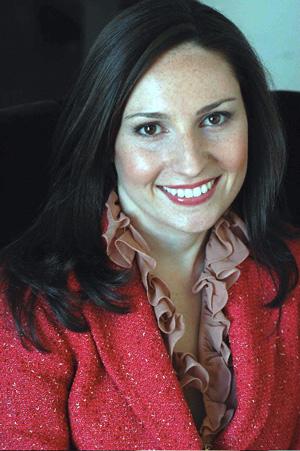
By Celine Klosterman
IOWA CITY — Young-adult Catholics may be setting themselves up for a letdown if they expect their spouse to be primarily a “soul mate.”
Christine Whelan, Ph.D., hammered that point home Feb. 19 during a talk on dating and marriage on the University of Iowa campus, sponsored by the Newman Catholic Student Center’s Journeys in Faith Speakers Forum.
If people expect a relationship to offer lifelong bliss, ordinary fights and tears could send them on the hunt for a new partner, said Whelan. She is a university professor of sociology and columnist for BustedHalo.com, a young-adult Catholic Web site. Certainly, love and friendship are important, but no one soul mate exists for anyone, she said.
That assertion may clash with many 18-25-year-old Catholics’ views. In a 2007 study by the Center for Applied Research in the Apostolate (CARA) at Georgetown University, 88 percent of such Catholics agreed one’s spouse should chiefly be a soul mate.
Their priority reflects a modern, individualized idea of marriage, said Whelan. Such a view contrasts with the two past cultural models of marriage the sociologist described. The first, a pre-20th-century institutional model, saw marriage as an economic partnership in which love wasn’t needed. The second, the companionate model of the 1930s to 1960s, focused more on friendship and sexual gratification.
Today, many people stress personal satisfaction in marriage above much else, Whelan said. The community-oriented idea of marriage as a “vocation” isn’t popular among young adults — nor is the idea of marriage as a “sacrament.”
Focus on personal fulfillment can lead to increased intimacy and equality between spouses, said Whelan. But it may also pressure a marriage to provide lifetime happiness – and contribute to divorce.
So, she asked, are young adults seeking the right qualities in a partner they hope will keep them happy? Forty-three percent of young-adult Catholics in the CARA study said it wasn’t important for them to marry another Catholic. But similar faith backgrounds — and similar family history — boost the likelihood two people will have a good marriage, Whelan said.
Research also suggests that the more often a man attends church, the happier his wife is, she said.
One quality championed by the church has shifted spots over the past few decades on people’s priority lists for a mate. Chastity, which male and female college students both ranked 10th of 18 desired qualities in 1939, thudded to rock bottom in 2008.
Other characteristics have moved up the ranks in the study, conducted by Whelan and university colleague Christie Boxer. “Mutual attraction, love,” which women listed third and men fourth in 1939, is now both sexes’ top priority.
Whelan also touched on trends relating to divorce. Though 43 percent of 18-25-year-olds in the CARA study said living together before marriage lowers the risk of divorce, no study supports that belief. That age group also largely agrees that couples don’t take marriage seriously enough when divorce is easy. But Catholics divorce at about the same rate as U.S. residents overall, she said.
To help Catholics create lasting marriages, the church offers Pre-Cana programs for engaged couples and the FOCCUS compatibility inventory. Whelan called a Pre-Cana event she and her then-fiancé took part in the “best weekend” of their relationship.
Clergy and lay people who help prepare couples for marriage could benefit from looking at the CARA data and similar research, Whelan said.








